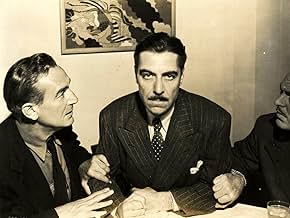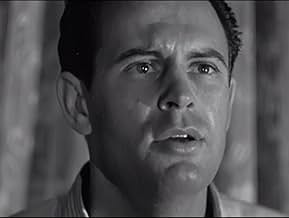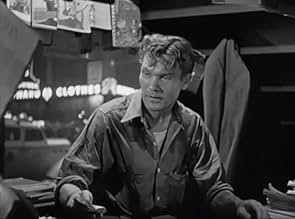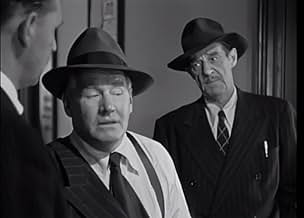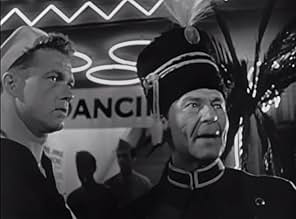CALIFICACIÓN DE IMDb
6.8/10
2.5 k
TU CALIFICACIÓN
Después de que una mujer que conoce es asesinada, un marinero a punto de zarpar tiene hasta el amanecer para encontrar al asesino, ayudado por una cansada chica de salón de baile.Después de que una mujer que conoce es asesinada, un marinero a punto de zarpar tiene hasta el amanecer para encontrar al asesino, ayudado por una cansada chica de salón de baile.Después de que una mujer que conoce es asesinada, un marinero a punto de zarpar tiene hasta el amanecer para encontrar al asesino, ayudado por una cansada chica de salón de baile.
- Dirección
- Guionistas
- Elenco
- Premios
- 1 nominación en total
Ernie Adams
- Waiter
- (sin créditos)
Fred Aldrich
- Beefy Nightclub Guest
- (sin créditos)
Walter Bacon
- Commuter
- (sin créditos)
John Barton
- One-Legged Man
- (sin créditos)
Billy Bletcher
- Waiter
- (sin créditos)
- Dirección
- Guionistas
- Todo el elenco y el equipo
- Producción, taquilla y más en IMDbPro
Opiniones destacadas
Terrific performances by many actors make this 1946 noir a joy to watch. Nifty murder mystery directed by Harold Clurman and written by Clifford Odets. As mentioned elsewhere on this board the dialog is wondrous; you never know what anyone will say, and everyone seems to "wax philosophic" throughout the film.
The action follows a murder of a woman and how it involves a sailor on leave, a dance-hall girl, and a taxi driver. The story takes place on a sweltering New York night in the early hours. The sailor must catch a 6 AM bus, so there's the "deadline at dawn." As the protagonists track down clues, they run across a bizarre collection of shady types, and everyone seems to to capable of murder, especially of this particular woman.
Susan Hayward gives a stunning performance as June. She starts out as a wisecracking and downhearted taxi dancer who resists getting involved but can't help herself since the sailor (Bill Williams) seems so innocent and naive. She calls him Boob McNutt. As they race around the city tracking down clues (this city never sleeps) they meet a world-weary taxi driver (Paul Lukas) who helps out. All three stars give amazing performances here.
Supporting players are also a knockout with Lola Lane terrific as the victim, Joseph Calleia as her creepy brother, Osa Masson (with a limp), and Marvin Miller, Jerone Cowan, Constance Worth, Al Bridge, Steven Geray, Joseph Crehan and others all solid.
Odets' writing is excellent even if all the characters seem to talk in the same poetic language. But it becomes mesmerizing as the characters seek the truth and talk. It seems that everyone is city wise but a poet at heart.
Hayward looks great with her hair pinned up (it's a sultry night) with bobby pins. She wears little makeup. Williams is also wonderful as the sailor who's not quite as dumb as he seems. Lukas is also solid as the surprising taxi driver.
Great film noir with touches of poetry and humor. What more could you want?
The action follows a murder of a woman and how it involves a sailor on leave, a dance-hall girl, and a taxi driver. The story takes place on a sweltering New York night in the early hours. The sailor must catch a 6 AM bus, so there's the "deadline at dawn." As the protagonists track down clues, they run across a bizarre collection of shady types, and everyone seems to to capable of murder, especially of this particular woman.
Susan Hayward gives a stunning performance as June. She starts out as a wisecracking and downhearted taxi dancer who resists getting involved but can't help herself since the sailor (Bill Williams) seems so innocent and naive. She calls him Boob McNutt. As they race around the city tracking down clues (this city never sleeps) they meet a world-weary taxi driver (Paul Lukas) who helps out. All three stars give amazing performances here.
Supporting players are also a knockout with Lola Lane terrific as the victim, Joseph Calleia as her creepy brother, Osa Masson (with a limp), and Marvin Miller, Jerone Cowan, Constance Worth, Al Bridge, Steven Geray, Joseph Crehan and others all solid.
Odets' writing is excellent even if all the characters seem to talk in the same poetic language. But it becomes mesmerizing as the characters seek the truth and talk. It seems that everyone is city wise but a poet at heart.
Hayward looks great with her hair pinned up (it's a sultry night) with bobby pins. She wears little makeup. Williams is also wonderful as the sailor who's not quite as dumb as he seems. Lukas is also solid as the surprising taxi driver.
Great film noir with touches of poetry and humor. What more could you want?
This is a strange little movie, which I'm sure is primarily due to Clifford Odets bizarre screenplay, but I freely admit that I really enjoyed it! The plot is somewhat convoluted (although not as hard to follow as some make out) and the ending is a little 'feel good' for a noir but Odets' dialog is what will bring you into it - or push you out. I still can't figure if the way his characters speak is closer to real life than 'regular' movie dialog, or nothing at all like anyone speaks; it somehow manages to be a little of both. One thing for sure is this is not how people normally speak in movies. Strong performances by Susan Hayward and Paul Lukas contribute to the fun; and that's what I found it to be. You've got likable characters, clever dialog, a mystery to solve before dawn, and Susan Hayward looking as good as I can remember. What else do you need?
Explosive lighting by cinematographer Nick Murasaca; a twisty, turning plot by mystery writer Cornell Woolrich; literate dialogue with heart from playwright Clifford Odets; and an estimable ensemble cast of fine character actors, plus a young, beautiful, and surprisingly effective Susan Hayward -- it all adds up to make this a little film noir gem.
It's a very New York piece, though it's also an example of RKO Pictures at its Hollywood best. And yet, for a film noir, there's a surprising sweetness, a current of innocence personified by the sailor boy accused of murder in a nocturnal urban jungle of violence, betrayal and corruption.
Highly recommended.
It's a very New York piece, though it's also an example of RKO Pictures at its Hollywood best. And yet, for a film noir, there's a surprising sweetness, a current of innocence personified by the sailor boy accused of murder in a nocturnal urban jungle of violence, betrayal and corruption.
Highly recommended.
When a blind ex-husband wearing a boutonnière shows up late in the evening demanding $1400, a good night is probably not in store. Especially when his former spouse's drunken excuse for not paying is "that sailor" must have stolen it. Thus begins Deadline at Dawn, an early noir that's not only a taut and agreeably complicated little mystery but that also aspires, and largely succeeds, in constructing an urban microcosm.
The sailor (Bill Williams) on shore leave has, as sailors on leave do, drunk too much, gambled away his money, been lured up to a wicked woman's apartment, and fallen into a blackout. (The movie's based on a novel by Cornell Woolrich, writing as William Irish, who knew whereof he wrote.) When he climbs back out, thanks to black coffee supplied by a kindly newsie, $1400 tumbles out of his pocket.
Trying to piece together the evening, he strays into a dime-a-dance palace, where he meets a would-be hard case (Susan Hayward in her 24th movie!). Making small talk with his bored-to-the-bone partner, Williams speculates whether a rainstorm might break the heat wave. "Such things have been known to happen," replies Hayward, thereby lowering the thermometer pronto. (The quirky, bristling dialogue by Clifford Odets is one of the many amenities of Deadline at Dawn.) Of course, Hayward inevitably thaws enough to offer counsel to Williams and serve as sidekick in his quest to make amends (he's a square-rigger right out of one of the square states). They return to the robbed woman's apartment only to find her (Lola Lane) dead. It's unclear to the befuddled Williams, and to Hayward, whether he might indeed have been the culprit. Trouble is, he's taking a 6 a.m. bus back to Norfolk, where he's stationed; there's only a few hours left to clear his conscience or fess up to the police.
An immigrant cabbie (Paul Lukas) improbably volunteers as a third ally, and the three, together and separately, embark on various sleuthing expeditions through the dark and soupy streets of Manhattan. For a movie that clocks in under an hour and a half, Deadline at Dawn boasts a cast just short of epic. Among the principals who intersect are Joseph Calleia, as a ruthless yet debonair gangster; Osa Massen as a lame housewife expelled from the rubble of Europe; and Steven Geray as a well-mannered stalker. Joining them are countless players with brief walk-ons, comic or poignant, of the 8-million-stories-in-the-naked-city variety, giving the movie the sole directorial effort by east-coast theater maven Harold Clurman its distinctive tone and texture. (Jules Dassin must have borrowed greedily from it when he came to film his own The Naked City during the sweltering New York summer of 1947.) Deadline at Dawn falls short of perfection. It's too short for all it contains, it's a bit sooty from all the red herrings, and its way out verges on the-butler-did-it (or maybe Roger Ackroyd). But a lot of RKO talent went into its making (in addition to the above, Nicholas Musuraca photographed it, and Hanns Eisler later to become a serious Leftist composer in East Germany wrote the score). But it has its own sweaty, big-city flavor, a pungent New York Story, and a prototype of many noirish delights yet to come.
The sailor (Bill Williams) on shore leave has, as sailors on leave do, drunk too much, gambled away his money, been lured up to a wicked woman's apartment, and fallen into a blackout. (The movie's based on a novel by Cornell Woolrich, writing as William Irish, who knew whereof he wrote.) When he climbs back out, thanks to black coffee supplied by a kindly newsie, $1400 tumbles out of his pocket.
Trying to piece together the evening, he strays into a dime-a-dance palace, where he meets a would-be hard case (Susan Hayward in her 24th movie!). Making small talk with his bored-to-the-bone partner, Williams speculates whether a rainstorm might break the heat wave. "Such things have been known to happen," replies Hayward, thereby lowering the thermometer pronto. (The quirky, bristling dialogue by Clifford Odets is one of the many amenities of Deadline at Dawn.) Of course, Hayward inevitably thaws enough to offer counsel to Williams and serve as sidekick in his quest to make amends (he's a square-rigger right out of one of the square states). They return to the robbed woman's apartment only to find her (Lola Lane) dead. It's unclear to the befuddled Williams, and to Hayward, whether he might indeed have been the culprit. Trouble is, he's taking a 6 a.m. bus back to Norfolk, where he's stationed; there's only a few hours left to clear his conscience or fess up to the police.
An immigrant cabbie (Paul Lukas) improbably volunteers as a third ally, and the three, together and separately, embark on various sleuthing expeditions through the dark and soupy streets of Manhattan. For a movie that clocks in under an hour and a half, Deadline at Dawn boasts a cast just short of epic. Among the principals who intersect are Joseph Calleia, as a ruthless yet debonair gangster; Osa Massen as a lame housewife expelled from the rubble of Europe; and Steven Geray as a well-mannered stalker. Joining them are countless players with brief walk-ons, comic or poignant, of the 8-million-stories-in-the-naked-city variety, giving the movie the sole directorial effort by east-coast theater maven Harold Clurman its distinctive tone and texture. (Jules Dassin must have borrowed greedily from it when he came to film his own The Naked City during the sweltering New York summer of 1947.) Deadline at Dawn falls short of perfection. It's too short for all it contains, it's a bit sooty from all the red herrings, and its way out verges on the-butler-did-it (or maybe Roger Ackroyd). But a lot of RKO talent went into its making (in addition to the above, Nicholas Musuraca photographed it, and Hanns Eisler later to become a serious Leftist composer in East Germany wrote the score). But it has its own sweaty, big-city flavor, a pungent New York Story, and a prototype of many noirish delights yet to come.
It is a shame that this is an all but forgotten example of Film Noir. Hopefully it will make a comeback. A sailor has apparently killed someone and has until dawn to find the real killer. Bill Williams, sort of a poor man's Lloyd Bridges, is serviceable as the sailor. But stealing the entire film and dominating the plot is a wonderful Susan Hayward, who somehow manages to be beautiful, sexy, and tough as nails as she in effect plays a hard-bitten private detective tracking down the truth. I would have loved to have seen Hayward, as a female, play one of those 1940's private eyes, or try her hand at the Stanwyck role in "Double Indemnity". But she's good enough here. If you spot this movie, SEE it. Hayward makes a good movie even better.
¿Sabías que…?
- TriviaJoe Sawyer's character of washed-up baseball player Babe Dooley was based on Chicago Cubs hitting great Hack Wilson whose alcoholism led to his steep professional and personal decline.
- ErroresAt the end, the main characters exit the 8th Police Precinct. It is night, and the streets are deserted. Yet when June and Alex drive away in the police car, it can be seen through the back window of the vehicle that the streets are bustling with activity, cars, and people, and it's bright and sunny.
- Citas
June Goffe: If you hear a peculiar noise, it's my skin creeping.
- ConexionesFeatured in Noir Alley: Deadline at Dawn (2017)
Selecciones populares
Inicia sesión para calificar y agrega a la lista de videos para obtener recomendaciones personalizadas
- How long is Deadline at Dawn?Con tecnología de Alexa
Detalles
- Fecha de lanzamiento
- País de origen
- Idiomas
- También se conoce como
- Deadline at Dawn
- Locaciones de filmación
- Backlot, 20th Century Fox Studios - 10201 Pico Blvd., Century City, Los Ángeles, California, Estados Unidos(New York night street scenes)
- Productora
- Ver más créditos de la compañía en IMDbPro
- Tiempo de ejecución1 hora 23 minutos
- Color
- Relación de aspecto
- 1.37 : 1
Contribuir a esta página
Sugiere una edición o agrega el contenido que falta

Principales brechas de datos
By what name was Un amanecer trágico (1946) officially released in India in English?
Responda
